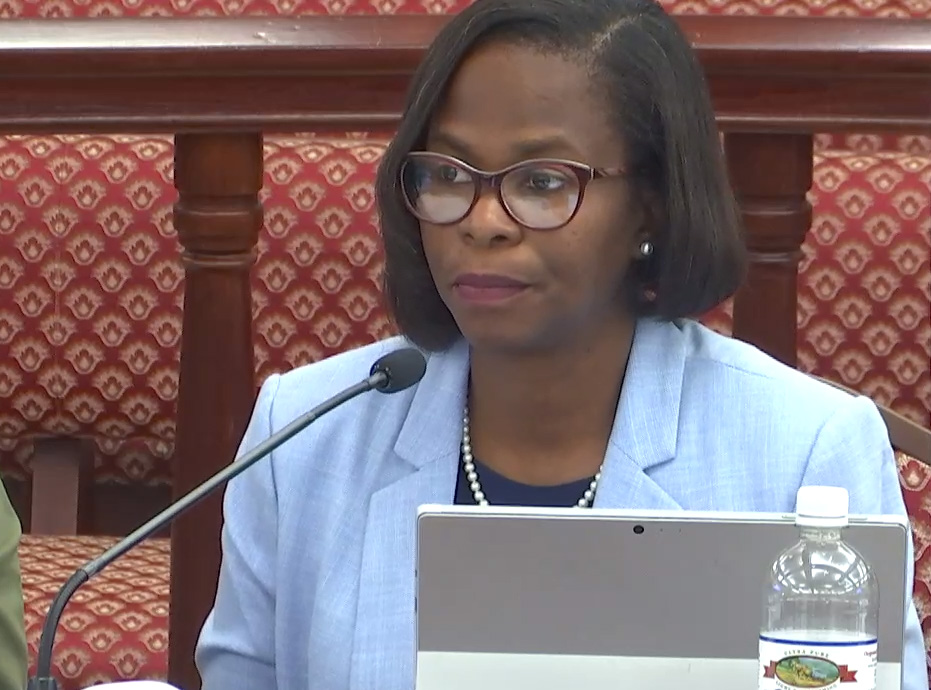
When the plan was made to save the Government Employees’ Retirement System from bankruptcy by using funds from the federal alcohol excise taxes returned to the territory from the mainland, the question arose, “Hasn’t that money already been committed somewhere.”
On Friday, the V.I. Legislature’s Committee on Finance heard from one agency where that money used to go – the Public Finance Authority.
Nathan Simmonds presented the Authority’s 2023 budget of $14.1 million, a 7.5 percent or $989,800 increase from Fiscal Year 2022.
The Authority’s budget is also used to fund the business operations of the Office of Disaster Recovery, such as office expenses, payroll, and administrative expenses.
Simmonds, director of finance and administration of the Authority, told the Finance Committee that the Authority’s annual budget of $10 million is normally funded with $5 million from gross receipts taxes and $5 million from the Internal Revenue Matching Fund, which is federal funding based on local rum production. However, because of the refunding of the PFAs Matching Fund Bonds, which are financed by the federal excise tax funds, and the issuance of the GERS Funding Note, a bond secured by those same funds, there are no excess Matching Fund Receipts to go to the General Fund or to fund the Authority.
The Authority has requested, therefore, a General Fund appropriation of $5 million to replace the Matching Fund appropriation for the Authority’s budget and $2 million to fund the Office of Disaster Recovery.
Adrienne Williams-Octalien, executive director of the Office of Disaster Recovery, also spoke at the hearing. She said in 2022, the Office of Disaster Recovery’s operating budget was $3.1 million, with $1.3 million currently spent.
Sen. Janelle Sarauw questioned why the Office of Disaster Recovery was requesting an increase for the upcoming year when it appeared not to be on track to spend all that had been budgeted for this year.
Williams-Octalien testified the increase was primarily due to the addition of six positions to manage the disaster recovery’s growing project list. She said Disaster Recovery has identified bottlenecks in the areas of permitting, contracting, design, and payment processing due to a lack of capacity, and hiring skilled talent will allow projects to progress as scheduled and have vendors paid promptly.
According to Williams-Octalien, Disaster Recovery expects funding from recovery projects will continue to circulate throughout the territory. She said roughly $1.63 billion is projected to be expended in 2023 across all recovery programs and as a result, for the year an additional $81.3 million in gross receipt taxes is projected to be collected.
Along with Sarauw, Sen. Kurt Vialet, chairman of the Finance Committee, questioned the $81 million figure. They said the figure was about $50 million more than the governor’s financial team projected.
Williams-Octalien said she was in discussion with Jenifer O’Neal, director of the Office of Management and Budget, over which figure was correct.
According to Williams-Octalien’s figures, collection for taxes on recovery projects would rise to over $100 million in 2024.
According to Simmons, last year the Public Finance Authority successfully negotiated the sale of the Kings Alley Hotel in downtown Christiansted, to include the dock and the Anchor Inn site for $3.65 million.
He said the properties were appraised in 2019 for $3.56 million. The Authority provided a severance package for all employees that included payment based on their tenure and pay for unused vacation time.
Other accomplishments he listed in his testimony for the Authority included:
- Obtained cancellation of $211.5 million of Community Disaster Loans for the Government
- Implemented enhanced monitoring of Lonesome Dove oil and gas leases.
- Implement strategies to coordinate the monitoring and regulatory oversight of the Limetree Bay and Rum Distillery.
However, Sarauw and Vialet visibly showed disappointment when they heard that only the agreements criteria for marketing was being monitored and the names of those receiving scholarship were not being released.


